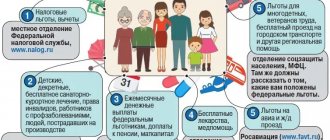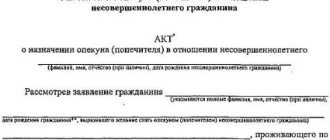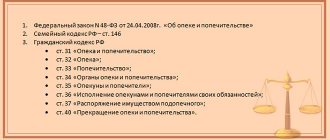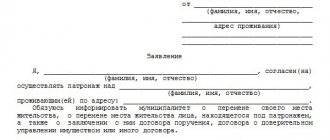2
Legal capacity is the ability of a citizen to have civil rights and bear civic responsibilities. A person is granted legal capacity upon reaching 18 years of age. However, in some cases he may be deprived of his rights due to health conditions. To exercise civic duties, a person must be aware of the consequences of his actions. The law provides for the need to care for persons who lack legal capacity. Let's look at how to arrange guardianship over a disabled person of groups 1, 2, 3.
What does guardianship provide?
An incapacitated citizen cannot independently exercise civil rights and obligations. In order to protect his interests, a guardian is appointed for him.
The guardian performs the following functions:
- represents the interests of the ward in government bodies;
- makes transactions on behalf of a disabled person (with the permission of the guardianship department);
- protects and preserves the property of the ward;
- pays taxes on behalf of the disabled person;
- satisfies the needs of the ward for food, clothing and treatment.
Guardianship can be appointed exclusively in relation to citizens who are deprived of legal capacity (Article 31 of the Civil Code of the Russian Federation). In relation to disabled minors, guardianship is also established for the purpose of their education.
One of the categories of citizens in need of care are people with disabilities. However, disability is not a basis for assigning guardianship. If a citizen is not deprived of legal capacity, then he independently protects his rights.
Who is most likely to be denied guardianship?
Relatives often become guardians
Those people who are relatives of the incapacitated patient have an advantage. The closer the relationship, the faster it will be possible to obtain guardianship.
In cases where it is impossible to appoint a guardian for a disabled person, the latter is sent to specialized institutions or social institutions.
The following categories of citizens may be denied guardianship:
- deprived of parental rights;
- having alcohol or drug addiction;
- if the potential guardian has diseases that can interfere with the normal performance of his duties;
- having a criminal record under articles for causing harm to human health, leading to severe injury or death;
- without a stable income;
- in the event that there is no housing suitable for caring for disabled people and meeting all sanitary requirements.
How much do caregivers of disabled people get paid?
The law provides for financial incentives for citizens acting as guardians.
As a rule, the payment directly depends on the age of the ward:
- the representative of a minor citizen receives a guardianship allowance, remuneration (if a paid form of guardianship is assigned), a one-time allowance when registering guardianship;
- a representative of an incapacitated adult ward receives 1,200 rubles monthly, a remuneration of 5% of the ward’s income (if a paid form of guardianship is assigned).
The guardian has no right to the property of the ward. He cannot sell, exchange or rent it. However, he can live in the ward’s apartment, together with him.
Types of government support
Let's take a closer look.
Where to find out what kind of help you can get
Tax deductions
A person who cares for a disabled citizen has the right to count on receiving standard and social tax deductions.
Read also: Subsidy for utilities in 2021
The standard tax deduction is 6,000 rubles. Social deductions are provided on the basis of a pension or insurance agreement with the state. Moreover, the above documents must necessarily be issued to the disabled citizen, and not to the guardian caring for him.
Benefits for guardians of incapacitated disabled people
If a person takes care of a disabled person who has been officially declared incompetent, he has the right to count on receiving a number of benefits and privileges from the state.
But despite the complexity of the task assigned to him, the amount of payments will still be less than for guardianship of a disabled minor. The resolution regulates only the minimum amount of benefits that must be paid to such citizens. At the moment, this minimum is only 1,200 rubles. In each region of the Russian Federation, the authorities have the right to independently revise the amount of payment and set it at a level acceptable to the budget.
Attention! Providing benefits is possible only for those citizens who are caring for an incapacitated person. Moreover, there are no requirements at the legislative level regarding the presence or absence of a guardian’s official place of work.
In addition to financial payments, citizens are provided with the following state support measures:
- Possibility of free legal assistance.
- There is no fee when filing claims in relation to property whose value exceeds 1,000,000 rubles.
- All notary services are provided with a 50 percent discount.
Each region provides its own list of benefits provided to this category of citizens, so you can clarify the exact support measures only in your social security department.
For example, in Moscow an additional discount of 50 percent is provided when paying for major repairs. In addition, a 50 percent discount is provided when paying for an MTPL policy.
In most regions of the Russian Federation, guardians of incapacitated citizens are provided with the following additional support measures:
- Extraordinary provision of land for the construction of your own residential building.
- Exemption from payment of transport tax for a car with an engine power of up to 200 hp.
Payments for guardians of citizens with disability group 2
Transfers of funds for caring for a disabled person of the second group are carried out from the federal and regional budgets. The following benefits are currently set:
- 5,500 rubles for caring for a disabled child.
- 1,200 rubles when caring for certain categories of citizens with disabilities.
Payments to guardians of citizens with 1st disability group
Guardians of citizens with the first disability group have the right to receive monthly financial assistance from the state. The following types of state support are paid in the Russian Federation:
- The standard payment is 60 percent of the minimum wage established in the region of residence of the beneficiary.
- When caring for a disabled person from childhood, the payment amount is 11,445 rubles.
- The amount of additional benefit is 3,357 rubles.
Depending on the region of residence of the guardian, the amount of payment provided to him may differ significantly, since it is set by local authorities based on the available budget.
Getting additional privileges
Citizens who care for a disabled child have the right to apply for the following types of additional privileges:
- Half-holiday.
- Registration of four additional paid days off.
- Do not work on holidays and weekends, regardless of the schedule approved by the organization.
- Do not go to work at night.
- Don't work overtime.
- Do not go on business trips.
- Receiving additional unpaid leave, the duration of which is up to 14 days.
Read also: GPC agreement with an individual
Citizens who care for children with certain diseases have the right to retire earlier. By law, every 18 months of such care removes one year of retirement age. The maximum number of years by which the age can be reduced is 5.
On a note! Families raising a sick child have the right to receive a discount on utility bills.
Benefits in the field of labor legislation
Citizens who provide care for persons with disabilities have the right to enjoy the following labor benefits:
- Possibility to work on a reduced schedule.
- Such citizens are given 4 additional days off per month, which are fully paid.
- The ability to not go to work on weekends and holidays, even if the organization provides for such a schedule.
- Possibility to refuse business trips and work overtime.
- Opportunity to take additional unpaid leave. The duration of such leave is 14 days within one year.
Tax benefits
Citizens who care for a person with a disability have the right to apply for a tax deduction. It comes in two types:
- Standard, the size of which is 6,000 rubles.
- Social, the size of which varies depending on the region of residence of the person and the characteristics of providing care for the disabled.
Social deductions are provided only for contracts issued in the name of a person under guardianship.
Benefits in the housing and communal services sector
Guardians of citizens with disabilities have the right to enjoy privileges in the field of housing and communal services.
In particular, they are given a discount on payment of housing and communal services bills, the amount of which is up to 50 percent. Most often, such a privilege is provided in the form of a subsidy, when a person is returned part of the money previously paid for utilities.
Benefits in the field of education
In the field of education, a guardian can only take advantage of the benefits provided for a child under his guardianship:
- If this is a full-time student, he is provided with financial support for the entire period of study.
- Discounts are provided for education in preschool institutions.
- The school provides two free meals a day.
- Free textbooks are provided.
Regional support measures
Most of the benefits are provided at the regional level. For example, in Moscow, guardians are provided with:
- reimbursement for utility bills;
- compensation for raising a child with a disability;
- financial support for a full-time student;
- compensation for raising an abandoned child.
In addition, material benefits are provided:
- Discount on preschool education.
- Free travel on public transport.
- Free two meals a day in an educational institution.
- Free medicines until the child reaches 3 years of age.
- Free textbooks.
Advice! In each region of the Russian Federation, the authorities have the right to independently adopt a list of benefits provided to guardians of disabled people. You can get acquainted with the privileges at the local social security office, as well as clarify the list of necessary documents for their registration.
What benefits are there for guardians?
Expert opinion
Stanislav Evseev
Lawyer. Experience 12 years. Specialization: civil, family, inheritance law.
Benefits for guardians are provided only for representatives of disabled children. Guardians of adult citizens deprived of legal capacity do not have additional support
From 2021, the payment to the guardian of a disabled child who performs his duties free of charge has been increased to 10,000 rubles . (Decree of the President of the Russian Federation of 2013 No. 175) Moreover, it is subject to change due to the regional coefficient.
Payment to guardians of an adult citizen remains at the level of 1,200 rubles . To obtain it, you must provide a certificate from the medical commission about the need for constant outside care for the ward.
To receive benefits, the representative must contact the Pension Fund of the Russian Federation. The payment is of a declarative nature.
Legal regulation of the issue.
The issue under consideration has been resolved at the federal level.
The main acts establishing the rules for granting preferences to persons who are guardians of disabled people include:
- Federal Law dated April 24, 2008 No. 48-FZ;
- Federal Law dated November 24, 1995 No. 181-FZ;
- Presidential Decree No. 1455 dated December 26, 2006;
- Presidential Decree No. 175 dated February 26, 2013.
- RF PP dated 04.06.07 No. 343;
- RF PP dated 05/02/13 No. 397.
Guarantees for guardians to receive state support measures are enshrined in Art. 31 Federal Law dated April 24, 2008 No. 48-FZ. According to paragraph 1, preferences are given not only to wards, but also to guardians.
Privileges are approved at the federal level and by acts of the constituent entities of the Russian Federation.
At the same time, the amounts of benefits and other deductions intended to ensure the life of the ward belong to the latter and are spent according to the norms of the Civil Code (clause 2).
Benefits to the guardian belong to him and are spent in accordance with his personal discretion (clause 3). Measures established by federal legislation may be supplemented by decision of regional authorities (clause 4).
Who can be appointed as a guardian?
The requirements for candidacy of a guardian are established by the Family and Civil Codes.
Primary requirements:
- lack of criminal record (for serious and especially serious crimes, active suspended conviction);
- availability of monthly income;
- absence of prohibited diseases (group 1 disability, oncology, infectious diseases, tuberculosis, alcoholism, drug addiction);
- availability of living space;
- citizenship of the Russian Federation;
- having full legal capacity;
- age from 18 years.
The guardian of a disabled minor must undergo specialized training. Courses are also provided for representatives of incapacitated adult citizens. Persons who are close relatives of the ward are exempt from training.
A person who has permission from the guardianship department at the place of residence to be a representative of the incapacitated person may be appointed as a guardian. To do this, you need to prepare documents and submit them to the department.
Links to legislation
The process of accepting guardianship is regulated by many pieces of legislation. First of all, the registration rules and status of a person with a disability are regulated by the law “On Social Protection of Disabled Persons” and the Federal Law “On Guardianship”.
According to the accepted formulation, a disabled person is a person who has an incurable serious impairment associated with a disease or injury. Not only a physical illness can be the reason for establishing the status of a disabled person, but also a mental disorder or disorder.
If the disability is not associated with mental disorders, the process of selecting a guardian is decided with the direct participation of the disabled person himself. The provision on foster care is also given in the Civil Code (Article 41). According to Articles 28-29, mental disorders are exempt from the need to coordinate the candidate for guardianship with the person himself.
Download the article. 31-41 “Guardianship and Trusteeship” Civil Code of the Russian Federation (493.9 KiB, 884 hits)
The Civil Code provides clarifications:
- which citizens and in what order are taken under guardianship (Article 32);
- on the legal status of the parties to guardianship (Article 35);
- on concluding transactions on behalf of the ward (clause 2 of article 29).
Family law defines the specific concepts of this process, and also provides a list of requirements of the applicant for guardianship (Article 146)
When violations are detected, punishment procedures are determined by the provisions of the Code of Administrative Offenses of the Russian Federation.
The procedure for registering guardianship over a disabled person of groups 1, 2, 3
Regardless of the disability group, it is possible to obtain guardianship over an incompetent person if the ward is deprived of legal capacity.
Procedure:
- Obtaining an ITU opinion . Recommendations on deprivation of legal capacity are made by the regional bureau of medical and social examination. Specialists study medical and social documentation and conduct an examination of the ward. The decision is made by commission. The result is the assignment of disability.
- Going to court . An adult citizen can be deprived of legal capacity only by a court decision. The process can be initiated by relatives or representatives of the guardianship department.
- Registration of guardianship. After the court decision enters into legal force, the law requires the establishment of guardianship within 30 days . If relatives or friends of the incapacitated person do not apply to the guardianship department, then the powers will be transferred to the head of a specialized organization.
Procedure
From the moment of deprivation of legal capacity, a citizen cannot live independently. Specialists of the guardianship department must immediately take measures to accommodate the disabled person. In the absence of loved ones, the citizen gets a job in a specialized organization.
If guardianship has been assigned to a disabled child, upon reaching 18 years of age, guardianship is terminated. After this, it is necessary to go to court to deprive him of his legal capacity. Maintaining representation over a disabled child is not provided.
Therefore, relatives or the guardianship department must initiate the appointment of a guardian over an elderly incapacitated citizen.
Algorithm of actions:
- Contact the guardianship department.
- Submitting an application.
- Obtaining a resolution.
If the court did not deprive the disabled person of legal capacity, but limited it, then guardianship, rather than guardianship, is appointed. With the same level of responsibility, the trustee has significantly fewer rights. For example, a ward can independently make transactions with the consent of the trustee and the guardianship department.
Contacting the guardianship department
Let's consider where to register guardianship for a disabled person. The applicant must contact the guardianship department located at the place of residence of the potential ward.
Before visiting, it is advisable to check the office hours of the department and the specific specialist. This can be found out by phone or on the organization’s website.
At a personal appointment, the specialist will provide a list of documents and give advice on all interesting and controversial issues.
Submitting an application
Let's look at how to make the right application for guardianship.
The document must contain the following information:
- position of the head of the municipality and his full name;
- applicant details;
- Title of the document;
- a request for the appointment of guardianship over an incapacitated person;
- information about the potential client;
- details of the document that deprived the ward of legal capacity;
- list of attached documentation;
- date and signature.
Sample application for the appointment of guardianship over a disabled person of groups 1, 2, 3
Obtaining a resolution
Let's look at how to obtain a guardianship order. The law does not provide for the possibility for guardians of disabled people to obtain an opinion and subsequently select a candidate for their ward. A citizen must immediately know which person he wants to be the guardian of.
After considering the application, specialists study the documents. A decision is made within 15 days. It is formalized in the form of a resolution of the district administration. The document must be certified by the signature of the head of the municipality.
Important! The resolution does not contain a validity period. It continues to be in effect until grounds for termination of guardianship arise.
If a certificate of inability to be a guardian is issued, the applicant has the right to challenge it in court within 14 days from the date of delivery.
The powers of a guardian are vested in the citizen from the moment he receives a positive decision from the district administration.
How to confirm disability?
Sometimes it is first necessary to confirm the fact of disability. In this case, you need to pass a commission to approve this status. It contains 3 main stages: a medical examination, a medical opinion and an assessment by a commission of experts.
Experts evaluate:
- whether the disabled person is able to move and care for himself independently;
- can it work;
- whether he controls the adequacy of his communication.
In order to be confirmed as a Group 2 disability, a person must exhibit a moderate level of impairment in all of the above skills, for example, after a stroke or due to other diseases. But at the same time, this group is considered working, and full guardianship is often not mandatory. Sometimes a person has limited capabilities, but he is quite capable of working in special conditions and performing simple household chores. For example, a visually impaired person of group 2 is quite capable of being independent at home, as well as in a specially equipped workplace, but in the rest of the environment he needs the help of a guardian. It is a completely different matter if the commission makes a decision on the need for guardianship due to mental illness.
Required documents
Let's look at what needs to be attached to the application for guardianship:
- passport;
- marriage certificate;
- autobiography;
- medical report;
- information about income;
- information about the availability of living space;
- consent of all citizens who live with the applicant;
- data on housing compliance with sanitary standards.
If the application is submitted by a relative of a disabled person who has lived with him for at least 10 years, then significantly fewer documents are provided (father, mother, grandmother, grandfather, brothers, sisters, grandchildren and children).
| No. | List of documents for relatives |
| 1 | Passport |
| 2 | Marriage certificate |
| 3 | Medical report |
| 4 | Information confirming family ties |








